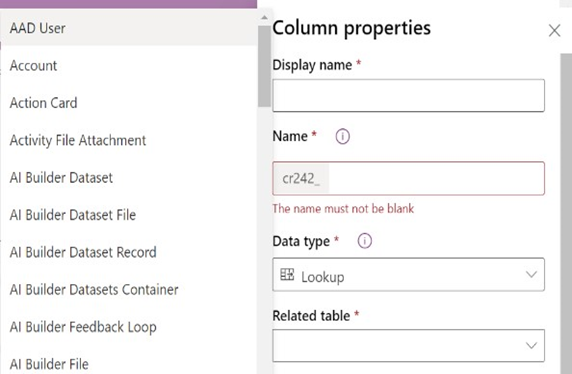Azure Active Directory user table
Note
Azure Active Directory is now Microsoft Entra ID. Learn more
Microsoft Dataverse includes a virtual table named AAD user (aaduser). This virtual table provides a connection to Azure Active Directory (AAD) and returns data about users within your AAD organization. No virtual table configuration is required to use the functionality. This is an online only feature.
Note
Your results with AAD User may differ depending on where it is being used. AAD User in Dataverse will provide the full list of users on the Azure AD for the organization. AAD User in Dataverse for Teams is limited to providing all AAD Users who are also a member of the Team.
AAD User does not return groups or distribution lists.
Lookups using AADUser
You can easily add a lookup to this virtual table from within the Power Apps portal.

Permissions
The AADUser table functions using Microsoft Graph. Users in your organization need to be assigned Graph permissions in order to view and use the AADUser virtual table.
Allowed operations
Only read and read-multiple operations are possible through the AADUser virtual table.
AADUser table Web API examples
This section contains HTTP GET examples for accessing data from the AADUser table.
Retrieving data
The following example demonstrate retrieving data from the AADUser table.
Retrieve all AADUser table rows
https://[Organization URI].crm.dynamics.com/api/data/v9.1/aadusers
Retrieve AADUser records with surname 'admin'
https://[Organization URI].crm.dynamics.com/api/data/v9.1/aadusers?$filter=surname eq 'admin'
Retrieve AADUser records with surname 'admin' or 'admin02'
https://[Organization URI].crm.dynamics.com/api/data/v9.1/aadusers?$filter=(surname eq 'Admin02') or (surname eq 'Admin')
Retrieve AADUser records whose companyname is not null
https://[Organization URI].crm.dynamics.com/api/data/v9.1/aadusers?$filter=companyname ne null
Retrieve AADUser records whose usertype is 'Member'
https://[Organization URI].crm.dynamics.com/api/data/v9.1/aadusers?$filter=usertype eq 'Member'
Retrieve AADUser records whose businessphones contains is '123-555-1212'
https://[Organization URI].crm.dynamics.com/api/data/v9.1/aadusers?$filter=contains(businessphones, '123-555-1212')
Retrieve AADUser records whose givenname starts with 'test'
https://[Organization URI].crm.dynamics.com/api/data/v9.1/aadusers?$filter=startswith(givenname, 'test')
Retrieve AADUser records whose givenname does NOT starts with 'test'
https://[Organization URI].crm.dynamics.com/api/data/v9.1/aadusers?$filter=not startswith(givenname, 'test')
Retrieve related Account records that referencing an AADUser record
Below, new_aaduser_account is the name of the 1:N relationship between the AADUser and the Account entity.
https://[Organization URI].crm.dynamics.com/api/data/v9.1/aadusers(<user ID>)?$expand=new_aaduser_account($select=accountid,name)
Referencing an AADUser row
The following example demonstrates referencing an AADUser table row.
Set lookup field value referencing an AADUser row
In this example new_testaaduserId is the single-valued navigation property created with a custom 1:N relationship between AADUser and Account entity. The name of this navigation property is defined in the OneToManyRelationshipMetadata.ReferencingEntityNavigationPropertyName property of the relationship. More information: Single-valued navigation properties
PATCH
https://[Organization URI].crm.dynamics.com/api/data/v9.0/accounts(<account ID>)
{
new_testaaduserId@odata.bind : "/aadusers(user ID)"
}
See also
aaduser table/entity reference
aaduser EntityType reference
Security and data access
Feedback
Coming soon: Throughout 2024 we will be phasing out GitHub Issues as the feedback mechanism for content and replacing it with a new feedback system. For more information see: https://aka.ms/ContentUserFeedback.
Submit and view feedback for